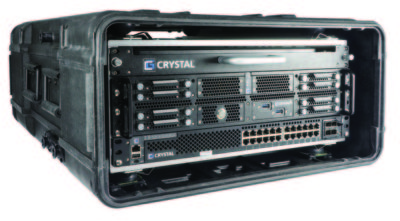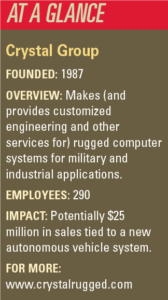 Methodical detective work by a CIRAS metallurgist helped a Hiawatha computer company keep a new product on track—and preserved the potential for an estimated $25 million in new sales.
Methodical detective work by a CIRAS metallurgist helped a Hiawatha computer company keep a new product on track—and preserved the potential for an estimated $25 million in new sales.
Crystal Group, a manufacturer of rugged computers for use in extreme military and industrial environments, was working on machines for a new autonomous vehicle last spring when the company noticed a problem. CIRAS project manager Adam Boesenberg ultimately diagnosed some corrosion in the computers’ cooling systems as stemming from the use of a coolant that has known problems interacting with aluminum parts.
Austin Kleinmeyer, a mechanical engineer with Crystal Group, said Boesenberg’s work ultimately helped the company place new specifications on its supplier, who had provided aluminum without the correct type of protective coating. Solving the problem required repeated tests of multiple parts before Boesenberg could confirm that the requested coating wasn’t there.
 “CIRAS helped us analyze the corrosion and trace it back,” Kleinmeyer said. “We don’t have the testing resources to do that. The CIRAS lab enabled us to look at the problem more holistically and understand the full cause and effect.”
“CIRAS helped us analyze the corrosion and trace it back,” Kleinmeyer said. “We don’t have the testing resources to do that. The CIRAS lab enabled us to look at the problem more holistically and understand the full cause and effect.”
“This is a common problem,” Boesenberg said. “What they were requesting from the supplier wasn’t necessarily what they got.”
In unrelated tests, Boesenberg also helped the company confirm that residue on a circuit board had been caused by an overheated motherboard and not any other kind of issue. Such work was incredibly valuable, Kleinmeyer said, because it helped Crystal Group prove to its customer that a corrective action for the issue was underway.
“The CIRAS lab is a very valuable resource for Crystal Group to partner with when deeper analysis is required than what our internal resources provide,” Kleinmeyer said. “Having contacts at the CIRAS lab allows us to respond quickly to our customers with a definitive action and resolution, and that is paramount.”
> For more information, contact Adam Boesenberg at aboesenb@iastate.edu or 515-294-5903.
A version of this article was published in the Winter 2020 edition of CIRAS News. To read more of that edition or others, please explore elsewhere on our website.